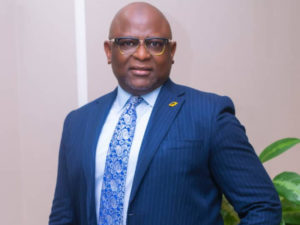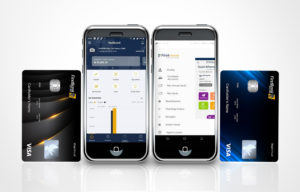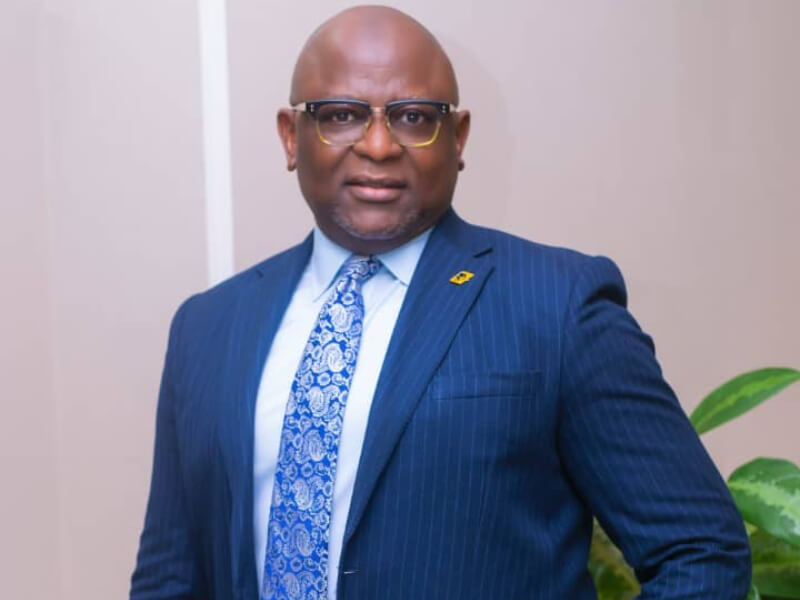Established in 1894 and offering a comprehensive range of services through more than 57,000 business outlets to over 17 million customers, First Bank of Nigeria’s impact is woven into the fabric of West African society. FirstBank’s adaptation to a digital economy has seen them lead the way in Nigeria as the first bank to issue over 10 million cards. FirstBank’s financial inclusion and cashless transaction drive has also resulted in some impressive figures with over 228 million users on its USSD banking service through the nationally acclaimed *894# banking service and over 3.4 million users on its Firstmobile platform FirstBank’s management team is made up of seasonal professionals led by Dr Adesola Adeduntan, the Chief Executive Officer of First Bank of Nigeria Limited. Here Digital Banker Africa speaks with Dr Adesola Adeduntan about the importance of adapting to the changes in the banking industry with ever evolving technologies, along with what we can expect from First Bank of Nigeria in the future.
-
DB: How has First Bank’s business model and strategy changed to adapt to digitalisation, as well as to take advantage of its benefits?
AA: FirstBank’s business model for the current strategic business cycle remains the same as the bank has continued to play the role of a dynamic financial services provider with a strong focus on delivering unique value propositions and excellent customer experience. At FirstBank, we have always been very deliberate in developing a strategy that is focused on building a bank for today and tomorrow. As such, our investments in digital technologies have been with a strong emphasis on building a future-proof digital bank. As such, the bank’s strategy is anchored on a robust multi-year digital transformation programme.
Over the last one year, in response to the impact of the Covid-19 pandemic on how we engage and interact with customers as well as collaborate internally to deliver services, the bank accelerated its responses to the various trends (particularly digitalisation) that were already reshaping the banking industry, through rapid execution of initiatives that deliver world-class innovative digital capabilities.
Specifically, the key strategy execution changes made by the bank include:
• Accelerating the deployment of capabilities that enable: end-to-end digital customer acquisition and onboarding across different customer segments, virtual customer relationship management and interaction leveraging collaboration tools to improve customer experience, remote work model for employees, lean operating model through robotic process automation (RPA), and artificial intelligence (AI), digital and virtual training delivery, amongst others.
• Significant investments to improve the resilience and capacity of the bank’s technology and cyber security infrastructure.
The bank has continued to reap significant benefits from its deliberate investments in digital innovation. Specifically, over the last one year, we:
• Recorded significantly improved uptime and service availability on our digital channels, providing increased value to the bank and improved experience to our customers. This is evidenced in the fact that the bank has the highest volume and value of transactions on the digital platforms in the industry.
• Reduced the overall cost of operations and increased the bank’s operational efficiency.
• Recorded nearly zero successful cyberattacks on our IT infrastructure. As a future-focused bank, we will continue to make the required investments that deliver innovative digital capabilities that will make us the most dominant and efficient digital bank in the markets where we operate.

-
DB: How did these changes help to boost First Bank’s business performance in 2019 and 2020?
AA: The accelerated execution of various digital initiatives as well as the additional strategic investments in digital innovation has helped to enhance the bank’s digital capabilities, leading to an appreciable improvement in the performance of the bank across relevant indices. Specifically, the bank has recorded the following performance improvements over the last one year:
-
Grew the most expansive digitally-driven Agent Banking Network in Nigeria to over 86,000 agents, the largest in the industry.
-
Increased customer account base (including wallets) to over 30 million
-
Maintained the dominant digital banking capability rating in Nigeria with over 20% market share of electronic banking transaction volumes; over 11 million issued cards; more than 11 million USSD banking platform users; and over 4 million mobile banking App users.
The above achievements have had a positive impact on the bank’s overall profitability.
-
DB: How has covid-19 impacted First Bank?
AA: Generally, the Covid-19 pandemic presented an opportunity for most organisations, including banks, to drive and accelerate the execution of disruptive digital initiatives – forcing organisations to realign their strategies to navigate the challenges of the new ways of engaging and serving customers. For us at FirstBank, I would say that it has been generally positive.
FirstBank’s strategy was developed from a forward-looking perspective with a strong digital focus. As such, the pandemic created opportunities for us to accelerate our responses to the many trends already reshaping the banking industry. Therefore, the pandemic has helped us to accelerate the implementation of digital and innovation initiatives in our strategic plan; ensuring that we quickly and seamlessly adapt to the dynamic operating and competitive environment. Overall, I would say that the implementation of the various changes in response to the Covid-19 pandemic, has had a positive impact on the bank as we grew our customer numbers, increased our market share of customers’ businesses, increased operational efficiency and profitability.
Access to financial services is a major enabler in personal and national economic growth, especially in Africa’s biggest economy. In a bid to enhance the access of micro-entrepreneurs and low income households to financial services, financial sector stakeholders led by the Central Bank of Nigeria (CBN) in 2012 introduced the National Financial Inclusion Strategy (NFIS) with the overall target of reducing the percentage of adult Nigerians that do not have access to formal financial services from 46% in 2010 to 20% in 2020. In 2019, the CBN Governor announced a target of 95% financial inclusion rate to be achieved in 2024.
-
DB: With the pandemic bringing financial inclusion increasingly further under the spotlight, please tell us about First Bank’s financial inclusion strategies.
AA: In the same vein, FirstBank recognised the need to provide affordable, accessible, and easy to use formal financial services to the bottom of the pyramid market segment and subsequently launched the revamped Firstmonie Agent Banking in 2018.
Right from the beginning, we were very clear and deliberate. We wanted an Agent Banking service that would expand reach to the mass market, mostly pace in the industry. Through the Firstmonie agents, we have offered banking services to our customers, other banks’ customers, and even non-account holders. Such services include Cash Deposit, Fund Transfer, Cash Withdrawal, Airtime purchase, Bill Payments, Account opening and BVN enrollment. It is still growing.
The recent negative impact of the pandemic on the global economy further amplified the need for financial inclusion. Generally, access to financial services through the traditional banking system was further reduced. However, we continued to provide financial services through our Firstmonie agents throughout the period, with over 295m transactions (96% YoY growth), worth over 6.6trn Naira (165% YoY growth) recorded in the course of the year.
To further deepen the Financial Inclusion drive, FirstBank also developed another product called the Firstmonie Wallet. It is a bank gnostic and telco-agnostic product that provides opportunities for those at the bottom of the pyramid to access financial services with minimum KYC requirements. By implication, such customers do not need to have a Bank Verification Number (BVN) / existing bank account, nor a smartphone, to register / transact, and could easily register via multiple channels like USSD, Agent location, APP download and web.

-
DB: With new players like fintech companies and start-ups entering the market, consumers will have more optionsto choose from. What is First Bank’s approach to facing new digital competitors?
AA: I believe the emergence of fintech companies and start-ups in the financial services industry is an exciting occurrence. This is because it promotes a culture of innovation across the financial industry, and emphasises the need to put the customers first and satisfy their needs. For us at FirstBank, our customers remain the first in all that we do. In over the 126 years of our journey as a leading financial institution in Nigeria, this has been our approach which is why we keep re-inventing ourselves in a dynamic manner, irrespective of the demand of the times.
In specific terms, our approach is to stay ahead by being the bank of first choice for whatever financial services our customers can think of. Innovation is at the core of what we do and that is why FirstBank Digital Innovations Lab established in 2017 serves as a hub for creativity and implementation of digital solutions that will greatly improve our customers’ experience on our digital platforms.
Again, at FirstBank we believe in what I can call co-opetition. We understand the need for strategic partnerships within the financial services industry to foster the collective growth of the Nigerian Financial System. Like every other thing we do, we are equally deliberate about this. For example, in order to create the right ambience to drive these key strategic partnerships, FirstBank in 2016 commenced an annual convention of the finest and most innovative top-level experts in the digital innovations space called “The FirstBank Fintech Summit”. We have held four editions of this summit and several groundbreaking ideas, digital solutions and partnerships have emerged from there. Knowledge is the wheel of innovation and sharing knowledge can only magnify the benefits.
The good thing is that leading Fintechs want to collaborate with FirstBank, both in the local and in the international space. We are currently responsible for about 20% of the industry’s interbank transactions nationwide, and over 25% of the card transactions. In 2020, our mobile banking App, FirstMobile, won the Best Mobile Banking App award in the Global Finance Best Digital Bank Awards and the BusinessDay Banks and Other Financial Institutions Awards respectively.
-
DB: What advice would you give to start-ups wanting to partner with big banks?
AA: Strategic partnership in most cases is beneficial to the parties involved. Start-ups need to realise this and pursue it. They are nimbler and don’t have to deal with legacy technology issues. There are benefits to glean from such partnerships; they get to leverage the wide market size of big banks which gives access to a huge customer base to drive their products and innovation and also stand tall on the trust customers repose in big banks to keep their money safe.

-
DB: The bank has started 2021 on a positive note releasing the First Bank virtual payment card, tell us a little more about this.
AA: Yes, we are excited to serve our customers with this innovative product. The FirstBank Virtual Payment Card is a non-physical digital representation of the holder’s payment card, linked to either the customer’s operative account or wallet account. It is an innovation that allows our customers to create a Naira or Dollar denominated debit card from the comfort of their home using their FirstBank Mobile App or FirstMonie Wallet. This card can be created in less than a minute and customers can immediately begin to transact with the card without having to visit any physical First Bank branch.
FirstBank Virtual Payment Card offers a convenient alternative to the use of cash and cheques by giving direct access to funds in customer operative or wallet accounts. It allows customers to perform seamless card not present (CNP) transactions on the Web. More so, through its contactless features, it will allow customers to carry out transactions on contactless acquiring devices such as POS and ATM via NFC-enabled mobile devices.
This innovation is also one of our responses to the COVID-19 pandemic and a reassurance of our “You First” commitment to our esteemed customers by providing convenient and seamless ways of meeting our customers’ dynamic lifestyle needs. It is widely acknowledged that the Coronavirus can be better contained by adopting a minimum touch interaction approach, thus FirstBank Virtual Payment Card ensures customer safety and an improved convenience in requesting and transacting with a card. The time spent in requesting a physical card is eliminated, the risk of exposure to the COVID-19 virus is reduced as well as providing a new and exciting user experience for our customers.
-
DB: The mask up, stay safe digital campaign proved to be very effective; is social media seen as a key area where First Bank can interact with current and future customers?



